One part Last Waltz, one part High Performance Rodeo: Calgary artists make pilgrimage to play final concert for beloved composer David Rhymer
 David Rhymer composed music for almost every Calgary theatre company over a four-decade career;, includng Mata Hari in 8 Bullets, a song cycle featuring Calgary's Onalea Gilbertson. Mata Hari won an award at the New York Musical Theatre Festival and the duo performed it in New York, at the Edinburgh Fringe and around Europe, as well as in Calgary. (Photo: Ben Laird)
David Rhymer composed music for almost every Calgary theatre company over a four-decade career;, includng Mata Hari in 8 Bullets, a song cycle featuring Calgary's Onalea Gilbertson. Mata Hari won an award at the New York Musical Theatre Festival and the duo performed it in New York, at the Edinburgh Fringe and around Europe, as well as in Calgary. (Photo: Ben Laird)
It was one part Last Waltz, one part High Performance Rodeo -- and, to paraphrase Led Zepplin -- a whole lotta love.
A collection of Calgary singers, actors, writers and puppeteers travelled to Salt Spring Island recently for a farewell concert featuring the music of David Rhymer, one of the city's musical lions for the past four decades.
On April 29, at ArtSpring, the Salt Spring Island Centre for the Arts – run by Cimmeron Meyer, a former Calgarian – they came to sing the favourite songs of Rhymer, who composed music for Alberta Theatre Projects, One Yellow Rabbit, Downstage, Green Fools, the Old Trouts, Lunchbox – just about every theatre company in the city – over 40 years.
"He was just such an important part of our story here in our artistic community," said Jennie Esdale, one of the co-founders of the Green Fools puppet theatre, who, by her own count, worked on 14 different projects over the years with Rhymer, including The Floating Mouse, a show about the 2013 Calgary flood.
The artists were called to Salt Spring on almost no notice because Rhymer -- who moved to the island with his wife in 2019 -- was sick and running out of time.
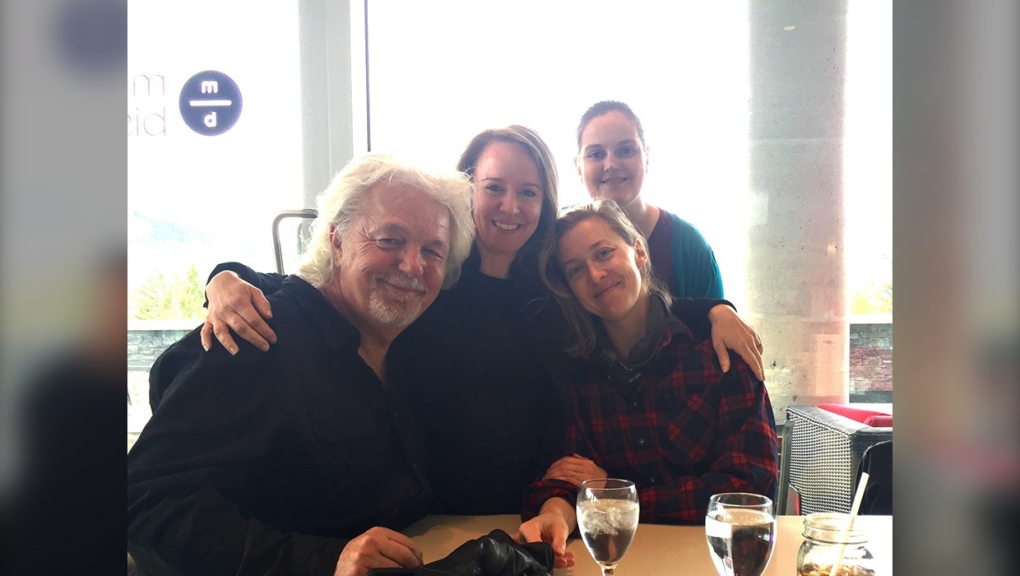 Rhymer with Green Fool Jennie Esdale and Jamie Konchak, who starred in The Floating Mouse in 2015
Rhymer with Green Fool Jennie Esdale and Jamie Konchak, who starred in The Floating Mouse in 2015
"He got his diagnosis just at the end of March or early April, so it was really quick," Esdale said. "From then, his partner and David were really excited about an idea of, could we all come together and do some songs?
"So we did make that happen for the 29th. He selected a group of artists and he selected 12 songs from across his (musical) canon – and then we all found our way to Salt Spring."
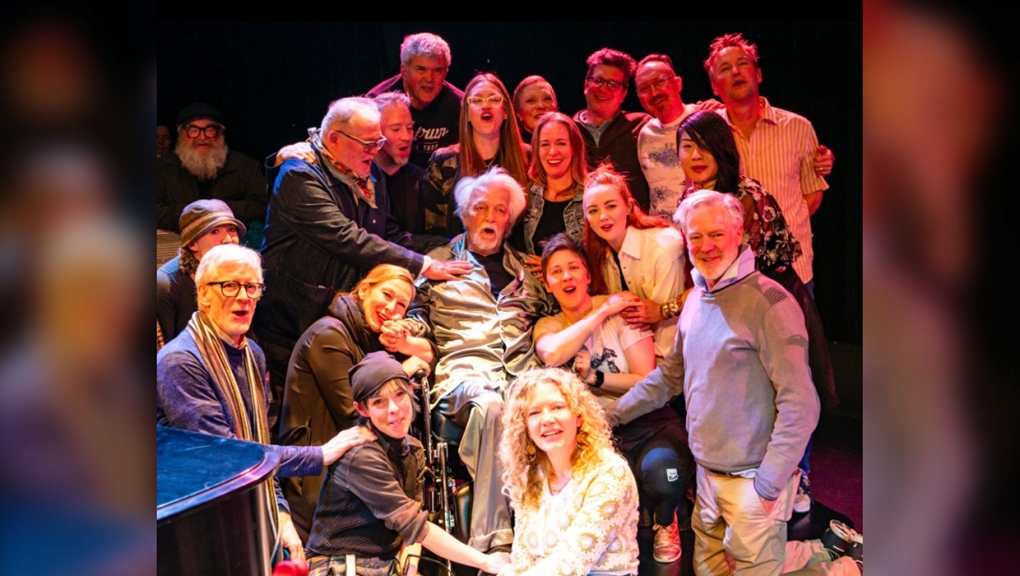 A group of Calgary theatre artists and musicians travelled to Salt Spring Island in British Columbia to perform the songs of David Rhymer (white-hair, middle) in a final farewel concert to the beloved composer, who died at the end of April. (Photo: Terry Hebert)
A group of Calgary theatre artists and musicians travelled to Salt Spring Island in British Columbia to perform the songs of David Rhymer (white-hair, middle) in a final farewel concert to the beloved composer, who died at the end of April. (Photo: Terry Hebert)
Community fixture
Rhymer was a warm, compassionate presence in the Calgary arts community. With a shock of white hair and beard, and a mischievous look in his eye, he was a community fixture with a wide range of interests and concerns – and sounds.
He was born in Karachi, Pakistan in 1953, grew up in Montreal, spent time in Thunder Bay and Vancouver in the 1990s, but mostly lived and created and told stories about Alberta, where his compositions sounded like they came from another time and place.
"My personal interest and fetish," Rhymer said, in a 2015 interview I did with him for the Calgary Herald, "is turn-of-the-century music from about 1890 to about 1930.
"That's really where my heart lies."
That fit quite nicely with the sensibilities of Calgary's experimental theatre company One Yellow Rabbit and its co-founder Blake Brooker, who collaborated with Rhymer on many productions over four decades, the first of which, Ilsa; Queen of the Nazi Love Camp, was a 1987 satirical fantasy that told the story of Albertan Jim Keegstra.
"In terms of a life, he was a man who snubbed the material world and was in conversation with the immaterial world," said Brooker.
"He spoke through melody," Brooker said. "He knew more about history and myth than the GST and HST."
Intuitive approach
Kris Demeanor worked with Rhymer on shows such as Crime Does Not Pay, a Downstage musical about the gritty heyday of comic books in New York City in the 1940s and 50s, and performed his music on Nightingale Alley, a song cycle Rhymer created by putting the poetry of 19th century , Regency-era prostitutes to music.
"I really clicked with David because we both approached music intuitively," Demeanor said. "We were self-trained and so whatever we lacked in precision, we made up for with creative abandon and experimentation."
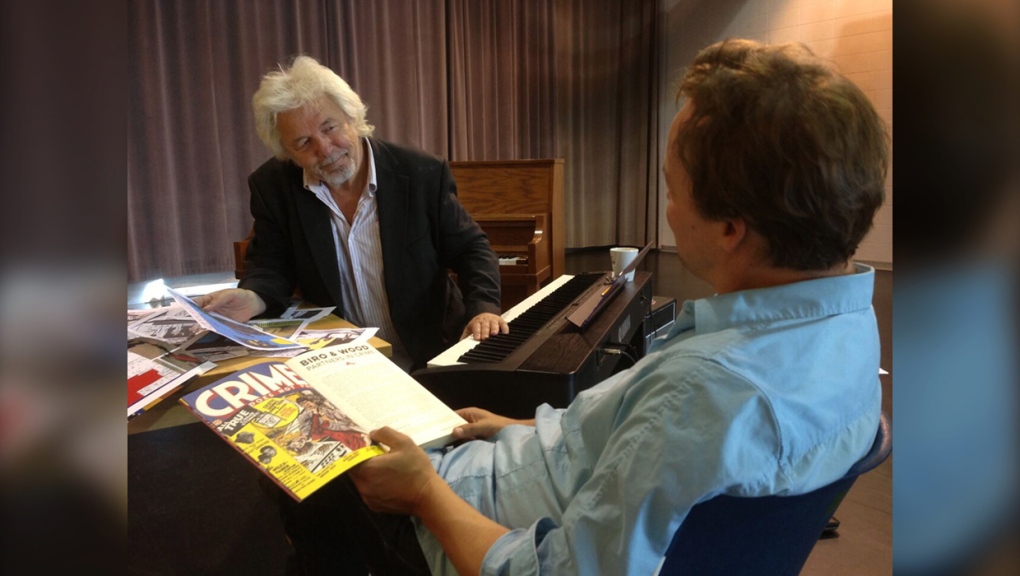 Rhymer and Kris Demeanor working on Crime Does Not Pay, a 2017 mini-musical they created along with composer Joe Slabe and director Simon Mallet that explored the comic book culture of New York City in the 1940s and 50s.
Rhymer and Kris Demeanor working on Crime Does Not Pay, a 2017 mini-musical they created along with composer Joe Slabe and director Simon Mallet that explored the comic book culture of New York City in the 1940s and 50s.
Demeanor said Rhymer had a gift for creative teamwork.
"In a collaborative group environment, he led without leading," he said. "He never dictated, but he would present a group with such beautiful songs that we would all naturally work as hard as we could to realize them. In the process, he'd eagerly accept suggestions and changes to a song if it was in the show's and the song's best interest.
"The songs I wrote forehead to forehead with David are the ones I am most proud of," he said.
Salt Spring
Esdale, Demeanor and musician Jonathan Lewis arrived early to Salt Spring in anticipation of the April 29 event, because there was one small issue with performing an evening of music composed by David Rhymer: he didn't write any of it down.
With Rhymer's health rapidly failing, Esdale reached out across the breadth of Alberta, to theatre companies that he'd worked with, to see what sort of archival material existed.
"We had some tunes that we had chord charts for," she said. "We had a couple made for piano – maybe two – and then we had lyrics and recordings.
"One of the tunes he picked was from Ghost River’s X-Rays and I said (to Ghost River founder Doug Curtis and his wife), do you have a recording? And they said we have it on cassette or VHS, so we had to find a way to play it!
“(One Yellow Rabbit's) Denise Clarke's song – we asked do you have a recording? And she did, but she didn't know how to get it from her computer to us.
"We said just get a voice memo."
Song by song, chord chart by chord chart, they pieced together a dozen tunes for the artists – all of whom had worked with Rhymer over the years – to rehearse prior to April 29.
There was another catch: while Rhymer was primarily a pianist, many of the songs appeared to have been adapted to guitar or violin chords.
However, that's where Lewis stepped in, Esdale said.
"Jonathan Lewis, much to the surprise of David, was able to turn a bunch of it into piano – because David thought this will go through guitar or violin or through the artists, but Jonathan turned it into piano which thrilled him.
"'Oh there was so much piano,' he said," Esdale added. "That was pretty special."
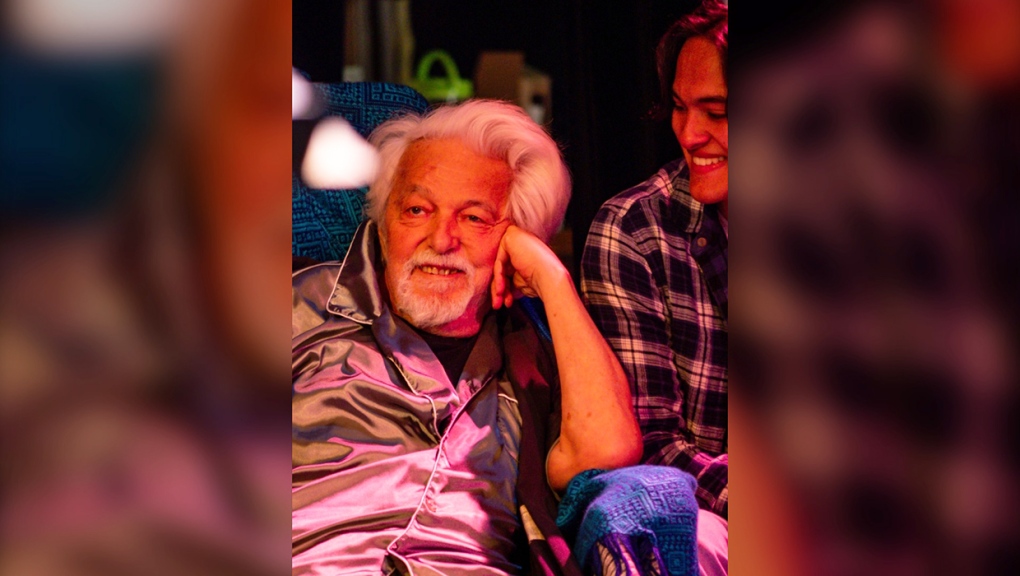 David Rhymer at the concert at Salt Spring, April 29, 2024 (Photo: Terry Hebert)
David Rhymer at the concert at Salt Spring, April 29, 2024 (Photo: Terry Hebert)
Female voices
Maybe it was raising three daughters, but Rhymer was known as a man who wrote well for women.
"The very first time I met and interviewed David, in 1989, we got into a serious conversation about feminism," said former Calgary Herald theatre critic Martin Morrow, who wrote a book about One Yellow Rabbit and also an obituary for Rhymer for the Globe & Mail.
"I think David, like John Murrell, had a deep interest in viewing history from the seldom-seen female perspective and it was reflected in his work, from his Mata Hari song cycle – a lifelong project – to his recent Nightingale Alley."
It was Mata Hari in 8 Bullets, a song cycle of Rhymer songs that turned into a show starring Calgarian Onalea Gilbertson, that took Rhymer and Gilbertson to New York after the show was selected to be part of the New York Musical Theatre Festival – and after it won an award there, to the Edinburgh Fringe and a tour of Europe.
In 2015, Gilbertson and Rhymer were in residence at the Cantos Musical Centre on 10th Avenue downtown when she spoke about the connection she felt with his music.
"I think I first met him in 1998," Gilbertson said. "I'd admired his work for many years, and had the pleasure to first work with him with One Yellow Rabbit when we did Dream Machine, and also I performed the role of Sabina in Why Freud Feinted when they did it at ATP several years ago.
"I, too, have a great love for that nether zone between contemporary classic music and musical theatre," she said. "And I feel like David is Canada's Kurt Weill, bringing an old world, haunted sensibility to what comes out of his hands.
"Just the subject matter that he writes about – the female characters – and the male characters – are just so interesting and complex," she added. "As a performer, to be able to have the chance to dig my teeth and my voice into that music is just irresistible – and is something I had wanted to do for a long time."
"I fetishize the ephemeral as a theatre artist," she said. "I love when things happen and it's magical and they disappear, that it's just there in the moment and the memory of the people, but I feel like I want to – I care so much about what David has created, I want to preserve it. And ultimately record it, and ultimately make it available for other performers in Canada and beyond.
"It needs to be documented," she said. "It’s a real treasury."
April 29
The night of the final performance, no one was sure whether Rhymer would be able to attend.
A few weeks earlier, One Yellow Rabbit had been scheduled to start rehearsing a revival of Dream Machine, when they got word of Rhymer's condition.
They put the whole thing on hold.
On April 29, as it crept closer to show time, a familiar face appeared at the venue.
"David was able to come, which we weren't sure he was going to be able to do," Esdale said. "Two of his three daughters were there."
"He was just offstage," said Esdale.
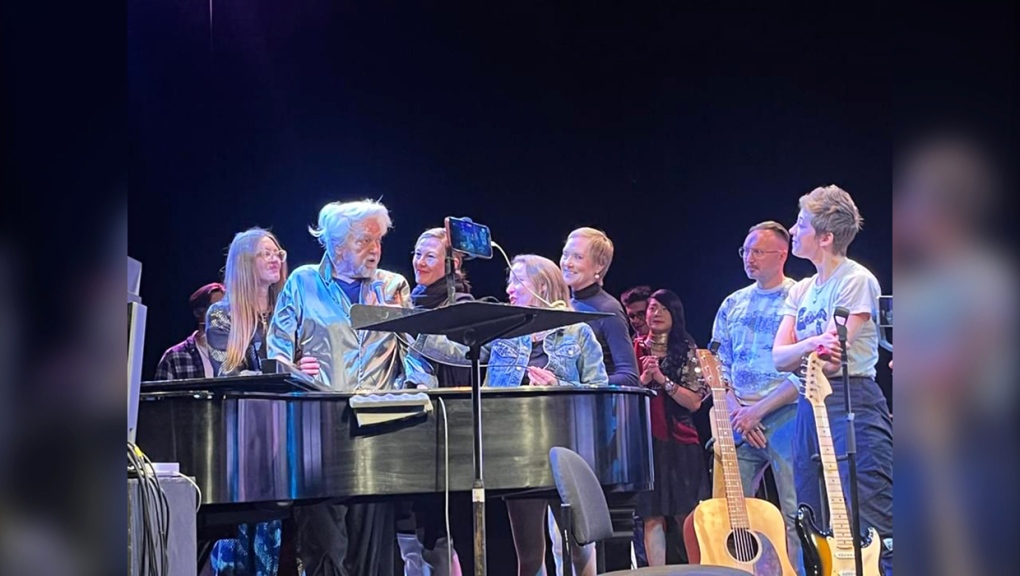 Rhymer and a collection of Calgary theatre artists at the end of the April 29 show in Salt Spring. (Photo: Terry Hebert)
Rhymer and a collection of Calgary theatre artists at the end of the April 29 show in Salt Spring. (Photo: Terry Hebert)
"It was a very profound experience to watch him delight in the songs and all the artists that had gathered there – all his closest collaborators over the years," she said.
"He got up at the end and we had a Steinway and he put his hands on it – and shared a few words," she said.
"Jonathan (Lewis) remembered that Beethoven, at the end of his life, was blind and deaf and could only feel the piano, the notes through the vibrations, so he thought oh I better play because David's hands were on the piano so Jonathan played and David said, 'Play me out.'
"So," she said, "Jonathan played him out."
There was a post-show party, with his partner and daughters and the singers. Rhymer died the next day, almost 24 hours after the concert of his favourite tunes.
"His work was based in fellowship in collaboration with artists he really loved," Esdale said.
"He would trust the work and his partners so much he wouldn't allow others to make changes. He would say, 'just believe in this and we'll see what happens.'"
"He would just repeat the words until it became a rhythm and then the words would just drop away and he would dash to the piano – and he would find the melody – and just create these beautiful, gorgeous scores no one thought we would ever be able to recreate because they were so distinct and textured and emotional and had so much depth."
He was 71.
CTVNews.ca Top Stories

LIVE UPDATES Multiple homes, businesses 'lost' to wildfire in Jasper National Park: Parks Canada
Officials from Parks Canada and Jasper say "multiple structures, including a number of businesses and homes, in and around the town of Jasper, have been lost" to wildfire in Jasper National Park.
Alberta premier says a third, perhaps half, of all Jasper buildings destroyed by fire
Alberta Premier Danielle Smith says early reports indicate a third and perhaps up to half of all buildings in the historic Rocky Mountain resort town of Jasper have burned in a wildfire.
Prince William's 2023 salary revealed in new report
Newly released financial reports show that William, the Prince of Wales, drew a salary of $42.1 million last fiscal year, his first since inheriting the vast and lucrative Duchy of Cornwall.
Tourist suffers 3rd-degree burns to feet after losing flip flops amid soaring temperatures in Death Valley
A tourist was hospitalized after suffering serious burns on his feet on Saturday when he lost his flip flops at a U.S. national park where temperatures soared past 48 Celsius.
'There's mom and dad's house': New video appears to show destruction of Jasper neighbourhood
Video posted to social media on Thursday morning appears to show the charred remains of a Jasper, Alta., neighbourhood.
Former judge with disputed Cree heritage likely has Indigenous DNA: law society
The Law Society of British Columbia says a DNA test shows a former judge and Order of Canada recipient accused of falsely claiming to be Cree "most likely" has Indigenous heritage.
Australian field hockey player opts to amputate part of his finger in order to compete in Paris Olympics
In the run up to the Paris Olympics, athletes have been stepping up their preparations in order to maintain their edge over competitors. But for Australia’s Matt Dawson, those preparations looked a little different this year, with the field hockey player opting to have part of his finger amputated in order to compete in the Games.
Canada to bring home fewest Olympic medals since 2012, according to forecaster
Fewer Canadians are expected to reach the Paris podium than in the previous two Olympic Summer Games, a global data analytics company predicts.
Jennifer Aniston criticizes JD Vance for 'childless cat ladies' remarks: 'I pray that your daughter is fortunate enough to bear children'
Jennifer Aniston is criticizing JD Vance for comments he made in his past about women without children.































